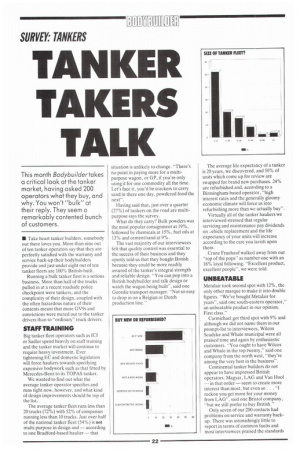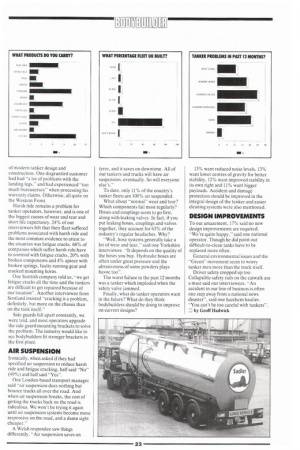TANKER TAKERS
Page 106

Page 107

If you've noticed an error in this article please click here to report it so we can fix it.
TALK
This month Bodybuilder takes a critical look at the tanker market, having asked 200 operators what they buy, and why. You won't "bulk" at their reply. They seem a remarkably contented bunch of customers.
• Take heart tanker builders, somebody Out there loves you. More than nine out of ten tanker operators say that they are perfectly satisfied with the warranty and service back-up their bodybuilders provide and just under eight out of ten tanker fleets are 100% British-built.
Running a bulk tanker fleet is a serious business. More than half of the trucks pulled in at a recent roadside police checkpoint were tankers, and the complexity of their design, coupled with the often hazardous nature of their contents meant that more GV9s and convictions were meted out to the tanker drivers than to -ordinary" truck drivers.
STAFF TRAINING
Big tanker fleet operators such as ICI or Sadler spend heavily on staff training and the tanker market will continue to require heavy investment. Ever tightening EC and domestic legislation will force hauliers towards specifying expensive bodywork such as that fitted by Mercedes-Benz to its TOPAS tanker.
We wanted to find out what the average tanker operator specifies and runs right now, however, and what kind of design improvements should be top of the list.
The average tanker fleet runs less than 20 trucks (72%) with 52% of companies running less than 10 trucks. Just over half of the national tanker fleet (54%) is not multi-purpose in design and — according to one Bradford-based haulier — that situation is unlikely to change. "There's no point in paying more for a multipurpose wagon, or GP, if you're only using it for one commodity all the time. Let's face it, you'd be crackers to carry sand in there one day, powdered food the next".
Having said that, just over a quarter (27%) of tankers on the road are multipurpose says the survey.
What do they carry? Bulk powders was the most popular consignment at 19%, followed by chemicals at 15%, fuel oils at 13% and cement/sand at 9%.
The vast majority of our interviewees felt that quality control was essential to the success of their business and they openly told us that they bought British because they could be more readily assured of the tanker's integral strength and reliable design. "You can pop into a British bodybuilder and talk design or watch the wagon being built", said one Geordie transport manager. "Not so easy to drop in on a Belgian or Dutch production line." The average life expectancy of a tanker is 20 years, we discovered, and 50% of units which come up for review are swapped for brand new purchases. 24% are refurbished and, according to a Birmingham-based operator, "high interest rates and the generally gloomy economic climate will force us into refurbishing more than we actually buy".
Virtually all of the tanker hauliers we interviewed stressed that regular servicing and maintenance pay dividends on .ehicle replacement and the life expectancy of your units will increase according to the care you lavish upon them.
Crane Fruehauf walked away from our "top of the pops" as number one with an 18% loyal following. -Excellent product, excellent people", we were told.
UNBEATABLE
Metalair took second spot with 12%, the only other marque to make it into double figures. "We've bought Metalair for years", said one south-eastern operator," an unbeatable product in our opinion. First class."
Carmichael got third spot with 9% and although we did not name them in our prompt-list to interviewees, Wilcox Seadyke and Whale municipal were all praised time and again by enthusiastic customers. -You ought to have Wilcox and Whale in the top twenty," said one company from the north west, "they're among the very best in the business".
Continental tanker builders do not appear to have impressed British operators. Magyar, LAG and Van Hool — in that order — seem to create more interest than most, but even so. . . "I reckon you get more for your money from LAG", said one Bristol company, "but we still prefer to buy British."
Only seven of our 200 contacts had problems on service and warranty backup. There was astonishingly little to report in terms of common faults and most interviewees praised the standards of modern tanker design and
construction. One disgruntled customer had had "a lot of problems with the landing legs," and had experienced "too much bureaucracywhen processing his warranty claims. Otherwise, all quite on the Western Front.
Harsh ride remains a problem for tanker operators, however, and is one of the biggest causes of wear and tear and short life expectancy. 24% of our interviewees felt that their fleet suffered problems associated with harsh ride and the most common evidence to attest to the situation was fatigue cracks. 68% of companies which suffer harsh ride have to contend with fatigue cracks, 20% with broken components and 4% apiece with broken springs, faulty running gear and cracked mounting horns.
One Scottish company told us, "we get fatigue cracks all the time and the tankers are difficult to get repaired because of our location". Another interviewee from Scotland insisted -cracking is a problem, definitely, but more on the chassis than on the tank itself."
Side guards fall apart constantly, we were told, and most operators upgrade the side guard mounting brackets to solve the problem. The industry would like to see bodybuilders fit stronger brackets in the first place.
AIR SUSPENSION
Ironically, when asked if they had specified air suspension to reduce harsh ride and fatigue cracking, half said "No" (49%) and half said "Yes".
One London-based transport manager said "air suspension does nothing but bounce trucks all over the road. And when air suspension breaks, the cost of getting the trucks back on the road is ridiculous. We won't be trying it again until air suspension systems become more responsive on the road, and a damn sight cheaper."
A Welsh respondee saw things differently. -Air suspension saves on
tyres, and it saves on downtime. All of our tankers and trucks will have air suspension, eventually. So will everyone else's."
To date, only 11% of the country's tanker fleets are 100% air suspended.
What about "normal" wear and tear? Which components fail most regularly? Hoses and couplings seem to go first, along with leaking valves. In fact, if you put leaking hoses, couplings and valves together, they account for 63% of the industry's regular headaches. Why?
"Well, hose systems generally take a lot of wear and tear," said one Yorkshire interviewee. -It depends on the quality of the hoses you buy. Hydraulic hoses are often under great pressure and the abrasiveness of some powders plays havoc too".
The worst failure in the past 12 months was a tanker which imploded when the safety valve jammed.
Finally, what do tanker operators want in the future? What do they think bodybuilders should be doing to improve on current designs? 13% want reduced noise levels, 13% want lower centres of gravity for better stability, 12% want improved stability in its own right and 11% want bigger payloads. Accident and damage protection should be improved in the integral design of the tanker and easier cleaning systems were also mentioned.
DESIGN IMPROVEMENTS
To our amazement, 17% said no new design improvements are required. -We're quite happy," said one national operator. Though he did point out difficult-to-clean tanks have to be replaced more often.
General environmental issues and the "Green" movement seem to worry tanker men more than the truck itself.
Driver safety cropped up too. Collapsible safety rails on the catwalk are a must said our interviewees. "An accident in our line of business is often one step away from a national news disaster", said one hazchem haulier. -You can't be too careful with tankers". 11 by Geoff Hadwick
























































































































